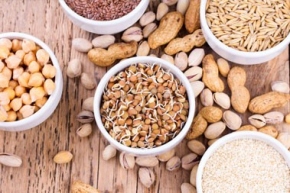- Axis Mutual Fund launches Axis Global Innovation Fund of Fund
- IHCL EXPANDS amã STAYS & TRAILS PORTFOLIO IN GOA
- Ending Period Taboo
- Scheme Snafu
- Equal Future
- Transcending Stereotypes
- Reboot for 2021- Refreshed & renewed with Jiva spa @ Taj, Goa
- Cottonfab 2021 at Kala Akademy
- Lockdown Dairy: Fests & Zatras remembered
- Aby Jose
Super Seeds
Little foods packed with loads of nutrients and beneficial effects
Seeds contain the starting materials necessary to develop into complex plants, many of which are edible by humans. Flaxseeds, sesame seeds, niger seeds, chia seeds, sunflower seeds, pumpkin seeds, musk melon seeds, etc. are not botanically true nuts, but have a similar nutritional composition.
Seeds are low in carbohydrates and rich in protein and unsaturated fatty acids. Because of their high fat content, seeds are high calorie foods. They are also rich sources of B-complex vitamins, vitamin E, calcium, phosphorus, zinc, copper, magnesium, selenium, iron and potassium and contain antioxidant compounds and plant sterols. When consumed as part of a healthy diet, they have many health benefits. Here are the nutritive values of a few common seeds:
FLAX: Also known as alsi or sonbiya, flaxseeds are a rich source of alpha linolenic acid particularly for vegetarians. They are high in soluble fibre in the form of mucilage gums, protein, vitamins B1, B2 and B6, phosphorus, magnesium, copper and manganese and contain insoluble fibre. They contain the phytochemical lignan which has been shown to have anti-cancer properties.
Being rich in both omega-3 fatty acids and soluble fibre, flaxseeds help lower levels of total and LDL cholesterol, which in turn helps reduce the risk of heart disease. When mixed with water, the mucilage gums in flaxseeds become very thick. This combined with the insoluble fibre content makes flaxseeds a natural laxative, thereby preventing constipation.
Flaxseeds are larger than sesame seeds and consist of a smooth and shiny hard shell with a mild nutty flavour. Ground flaxseeds are easier to digest than whole seeds as the latter pass through undigested without providing any health benefits. Due to their high fat content, flaxseeds and flaxseed powder turn rancid very fast. So it is best to store them in the refrigerator. Flaxseeds can be added to or sprinkled on almost any food. To add them to your diet use them in roasted and powdered form in pancakes, french toast, baked goods, smoothies, yogurt, breakfast cereals, soups and salads. They can also be eaten as a delicious dry chutney powder instead of pickles along with meals.
CHIA: Chia seeds are tiny black seeds from the plant Salvia Hispanica that grows natively in South America and in the last few years have gained popularity as a health food. They have a very low content of digestible carbohydrates and contain 40 per cent fibre – by weight mostly soluble, protein, omega 3 fatty acids, calcium, phosphorus, magnesium, zinc, potassium, vitamins B1, B2 and B3. They are also high in antioxidants that have various health benefits. Chia seeds have a very mild nutty flavour and are very easy to incorporate into the diet.
Studies have shown that chia seeds have various health benefits, ranging from weight loss to reduced inflammation, but more research is needed.
Unlike flaxseeds which should be ground, chia seeds can be consumed whole. They can be eaten raw or cooked, sprinkled over breakfast cereals, curd, milkshakes, smoothies or added to baked products like breads and muffins. They can also be added to vegetable dishes or salads. Because of their ability to absorb liquid and form a gel, they can also be used to thicken sauces or as a replacement for eggs especially in vegan recipes.
Chia seeds and sabja seeds (falooda seeds) look similar. Chia seeds are oval and reddish brown, while sabja are black and shaped like tear drops. Chia seeds take time to absorb water while sabja seeds swell up in seconds.
SUNFLOWER: Delicious, nutty and crunchy, sunflower seeds are widely considered a health food. They are especially rich in the poly-unsaturarated fatty acid (PUFA) linoleic acid and also contain good amounts of the monounsaturated fatty acid (MUFA) oleic acid that helps lower LDL cholesterol and increases HDL cholesterol in the blood. Like other seeds and nuts, sunflower seeds are also an excellent source of protein, vitamin E, B-complex vitamins, calcium, magnesium iron, zinc, manganese, selenium and copper. They also contain antioxidant polyphenol compounds such as chlorogenic acid, quinic acid, and caffeic acids. Eating sunflower seeds may help lower cholesterol levels, provide anti-inflammatory and cardiovascular benefits and prevent cancer. Sunflower seeds can be roasted and salted and enjoyed as a snack. They can also be used to garnish salads, vegetable dishes or sprinkled over porridge or breakfast cereals.
Read the full article in 'Viva Goa' magazine copy.
Viva Goa magazine is now on stands. Available at all major book stalls and supermarkets in Goa.














